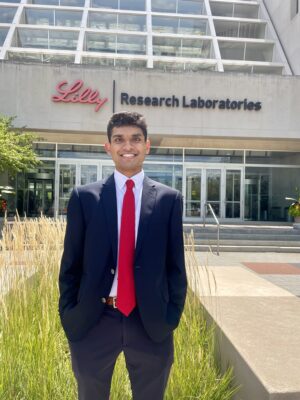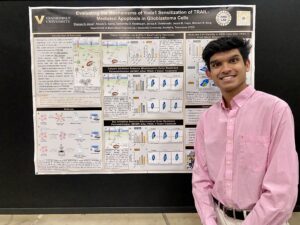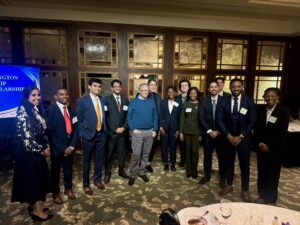A lot of nerve: One undergraduate’s path to treating brain cancer

It all started during his senior year of high school, when Shanay Desai watched the world go digital due to the pandemic.
During that time, Desai mentored lowerclassmen from other high schools through a virtual STEM outreach program. It was then that his interest in neuroscience was sparked.
“We would teach them a little bit about the brain and the nervous system,” Desai said. “Studying neuroscience opened my eyes to how much we still don’t know about the nervous system and ways to treat central nervous system diseases, and that mystery completely hooked me. I wanted to dig deeper when I got to college, so I pursued neuroscience at Vanderbilt, focusing on research to find novel ways to treat brain cancer.”
Desai wasted no time getting into the field once he was on campus, joining the lab of former Vanderbilt professor Michael King. In King’s lab, Desai worked with his primary mentor Nicole Sarna, MS’24, on developing novel treatments for glioblastoma multiforme (GBM), an aggressive adult brain cancer with no known cure.
Desai also joined the Vanderbilt SyBBURE Searle Undergraduate Research Program during the spring of his freshman year as part of his Immersion Vanderbilt experience. The program has provided Desai with funding for his research in King’s lab, as well as allowed him to attend conferences in the field. Desai works closely with Jonathan Ehrman, assistant professor of the practice of biomedical engineering and director of SyBBURE, to discuss research challenges and for guidance and mentorship.
Now a senior double majoring in neuroscience and drug discovery and biotechnology, Desai has co-authored two publications that highlight the lab’s findings of a new platform that could enhance the reprogramming and death of GBM cells that completely evade healthy cells—addressing a huge challenge for chemotherapy. The research was funded by the National Institutes of Health, SyBBURE, and the Barry Goldwater Scholarship and Excellence in Education Foundation.

Desai’s work in the lab also contributed to his Immersion project, “Evaluating the Mechanisms of Yoda1 Sensitization of TRAIL-Mediated Apoptosis in Glioblastoma Cells.” Desai presented his research findings at the Biomedical Engineering Society’s Annual Meeting in 2022.
“I think for me, the biggest reason that I was really interested in research was being able to disseminate and give knowledge to other people to use for the future,” Desai said. “I’ve learned that you don’t have to be a graduate student or a postdoc to be published. You can be at any stage of your career, as long as you do good science and put it out there for the world to see. Through my time at Vanderbilt, I’ve learned so much about the scientific journey, how to write a paper, and how to work with peers in terms of authorship.”
Along with King and Ehrman, Desai worked closely with Carrie Jones, associate professor of pharmacology. Jones and Desai met during his freshman year when he took a course on drug discovery for neuropsychiatric disorders, and she helped him design his interdisciplinary major in drug discovery and biotechnology.
“Ever since, she’s been one of my biggest supporters and mentors,” Desai said. “I meet with her once or twice a week, and she helps guide me through any professional, social, or even mental health related issues. She’s been there for every single roadblock I’ve had and every step of my journey, which has been awesome.”

Desai recently won the Dennis Washington Leadership Graduate Scholarship, totaling $250,000, which he plans to use to earn a Ph.D. in pharmacology at the University of Pennsylvania. He was awarded the scholarship after participating in a three-day interview process in California, where he had the opportunity to network with scholarship alumni and high-profile executives such as former Microsoft CEO Bill Gates.
During graduate school, Desai intends to study new ways to understand delivery mechanisms to the human brain and design novel therapeutics for brain cancer patients.
“I plan on breaking into the start-up industry post-Ph.D., hopefully using the technologies and methods I develop during my studies,” Desai said. “I worked at Eli Lilly and Company last summer as a biotherapeutic scientist. This was my first entry into the pharmaceutical space and biotech industry, and it really pushed me to want to get my Ph.D. and advance the knowledge in the brain cancer space for scientists and clinicians to use.”
Desai credits the mentors he had at Vanderbilt with not only helping him conduct research as an undergraduate, but also with providing a support system—something he hopes he can give to others moving forward.
“I think mentorship and advocating for myself and others are the biggest things I want to take with me post-Vanderbilt,” he said. “Thinking about when I’m in graduate school and mentoring undergraduate students who come in for a summer internship, I’d like to give them those hands-on opportunities, because I’ve been fortunate enough to receive those at Vanderbilt.”
